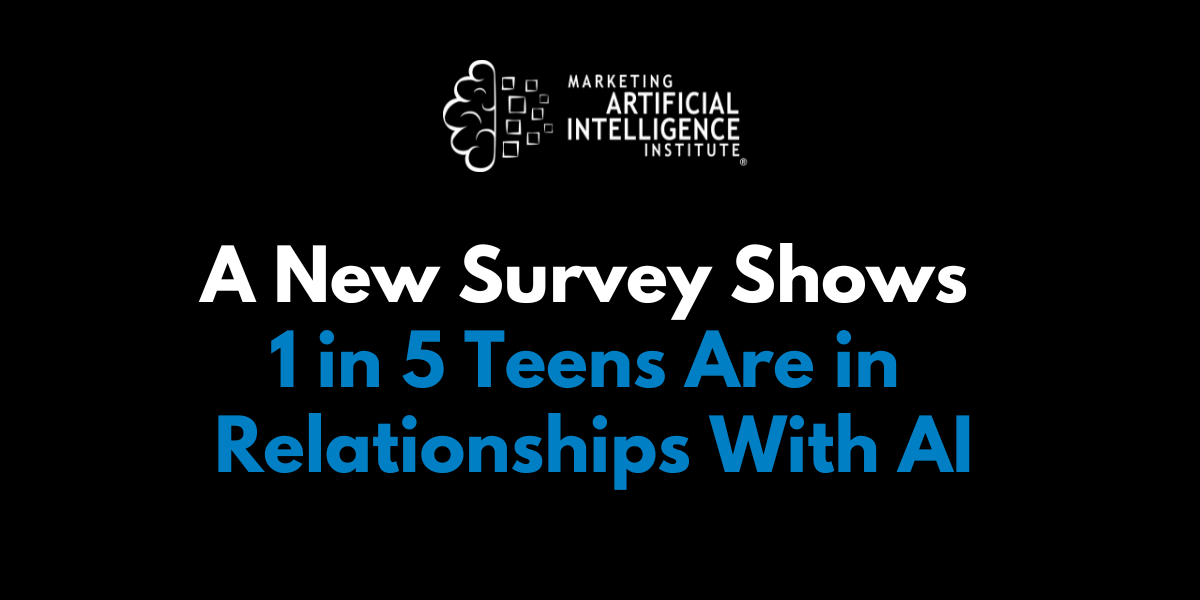An Ohio lawmaker is introducing a bill to legally ban humans from marrying AI.
Sound sci-fi? It may not be so far-fetched. Because at the same time, a new national survey indicates teens are forging relationships with AI.
Nearly one in five U.S. high schoolers reported that they or a friend have had a romantic relationship with an AI chatbot, according to the Center for Democracy & Technology (CDT).
This highlights a startling, fast-moving trend: AI is rapidly weaving itself into the fabric of human relationships.
To make sense of these wild developments, I talked through it with Marketing AI Institute founder and CEO Paul Roetzer on Episode 176 of The Artificial Intelligence Show.
A Bill to Prevent “AI Marriages” in Ohio
First, Ohio State Representative Thaddeus Claggett has introduced a bill to declare AI systems "nonsentient entities." In other words, to declare that AI is not alive or a conscious being.
This would legally block AI from having personhood, owning property, or, most notably, marrying a human.
Roetzer was stunned that this is even a legislative topic. “I just shake my head in disbelief that we need to have bills about people marrying AI,” Roetzer said. "The fact that there's a need to even have this conversation is kind of crazy to me.”
Yet, here we are. And there’s a reason why we’re having the conversation now.
One in Five Teens Report Romantic AI Relationships
While the Ohio bill seems hard to believe, the numbers show it’s addressing a real issue. The CDT report, which surveyed high schoolers, parents, and teachers, found that 19 percent of high school students say they or a friend have had a romantic relationship with AI.
The numbers go even further:
- 43 percent of teens surveyed use AI for advice on relationships with other humans
- 42 percent use AI for mental health support
- 42 percent turn to AI as a friend or companion
“That's nuts," Roetzer says.
The survey also found that over a third of students (38 percent) say it's easier to talk to AI then to their parents.
"That is sad, but probably true," Roetzer says. "That one I could actually see."
Parents Have No Idea
A huge part of the problem is a massive awareness gap.
The CDT survey found that 70 percent of students believe their parents have no clue how they are interacting with AI. Parents seem to agree, with 66 percent admitting the same.
This, combined with the 42 percent of parents who worry about students developing an emotional connection with AI, points to a serious disconnect.
For Roetzer, these numbers are a clear and present warning, especially for parents.
"If you're a parent, you got to understand this stuff and you have to talk to your kids about it," he says.
He notes that the best parallel we have for this societal shift is the impact of social media, which fundamentally changed behaviors. The data already shows AI relationships aren’t a future problem. They're happening right now.
"I feel like we all kind of have an obligation to do our best to prepare people in our circles," he said. "If we don't have these conversations, then this could go sideways real fast, and I don't want to see that happen."
Mike Kaput
Mike Kaput is the Chief Content Officer at SmarterX and a leading voice on the application of AI in business. He is the co-author of Marketing Artificial Intelligence and co-host of The Artificial Intelligence Show podcast.


